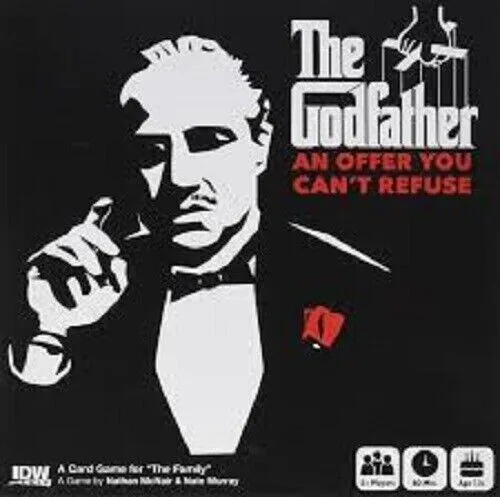The Godfather Game (1971)
The Godfather Game
“The Godfather Game” is an economic board game about the mafia, designed by Jody Porter and published in 1971 by Family Games, Inc. The game was released with the slogan “a game for all the families” and was packaged in a unique plastic violin case indented with a Tommy Gun, which has since become a collectible item. The game has experienced several reprints, including a 2017 edition published by CMON, titled “The Godfather: Corleone’s Empire”.
Why is The Godfather Game Popular?
The Godfather Game is popular for several reasons:
– Mafia Theme: The game’s theme revolves around the mafia, which has always been a fascinating subject for many people.
– Economic Strategy: The game combines economic strategy with the mafia theme, allowing players to control rackets in various neighborhoods to gain the most money and become the Godfather.
– Abstract Tactics: The gameplay involves tense neighborhood battles, with players using fingerman cards to eliminate their opponents’ men.
– Realism: The game is considered to be fairly realistic, with the tactics of neighborhood battles being somewhat abstract but immersive.
Game Components of The Godfather Game
How To Setup The Godfather Game
To set up the game, players first place the board, which features a map of Manhattan. Each player chooses a token color (red, yellow, green, or blue) and receives the corresponding tokens and money. The good break and bad break cards are shuffled and placed within reach. Players then determine their starting positions on the board, ready to begin their quest for control.
Gameplay Mechanics and Game Objective
Player Experience
The Godfather Game offers a unique blend of strategy and luck, with players navigating the challenges of area control and tactical card play. The game’s theme and mechanics, although simplistic by today’s standards, provide an engaging and nostalgic experience for those who enjoy classic board games.
Pros
Cons
Personal Thoughts on The Godfather Game
The Godfather Game is ideal for collectors of vintage board games, those interested in the history of game design, and players who enjoy simple yet strategic gameplay. While it may not offer the complexity and depth of modern games, it provides a unique and entertaining experience that reflects the gaming culture of the 1970s.
We are supported by our audience. When you purchase through links on our site, we may earn an affiliate commission, at no extra cost for you. Learn more.

